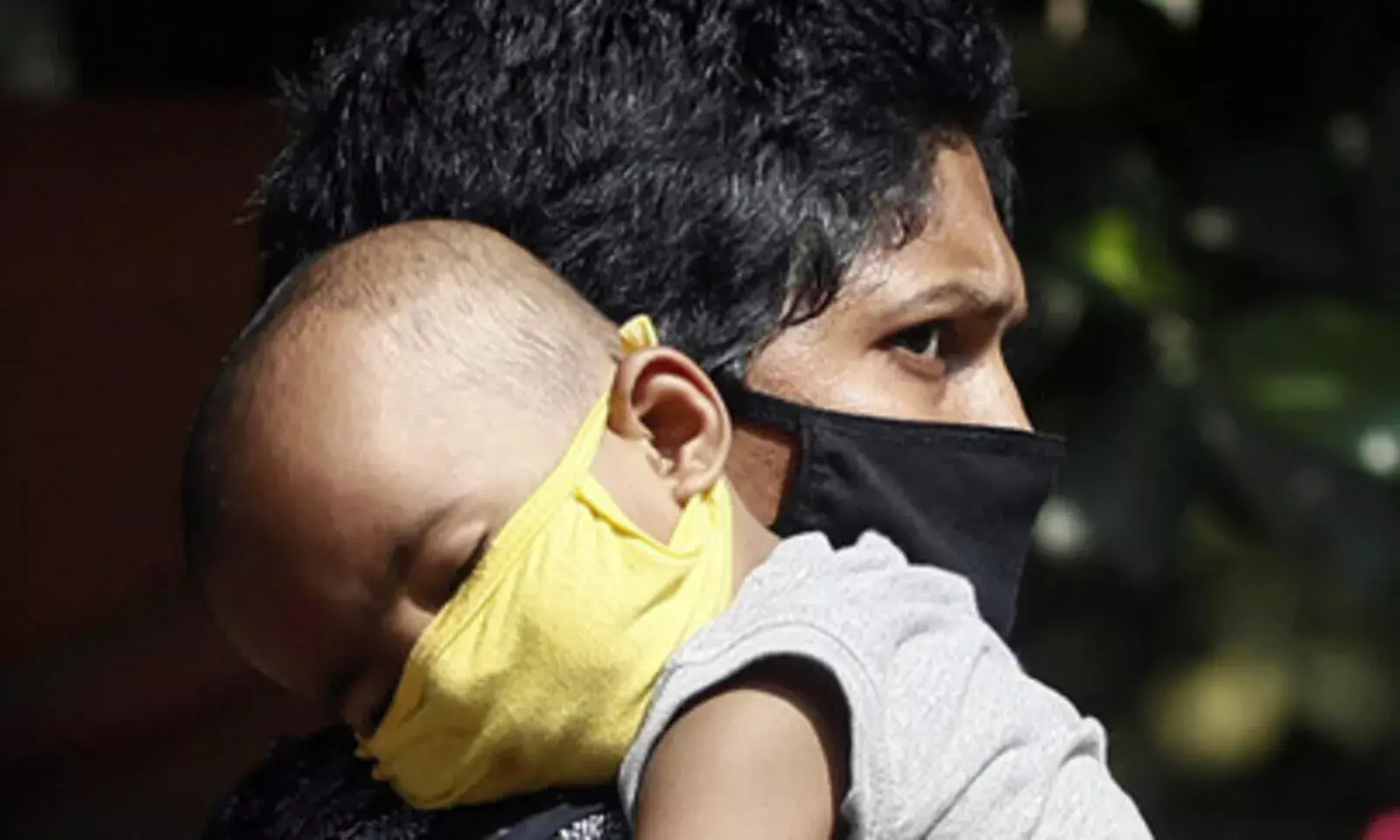Explained: Why Should Children Under 5 Not Wear Masks
Suffocation, constant fiddling & no evidence to prove masks protect children are some reasons behind the move, say docs

Image Source: REUTERS / FRANCIS MASCARENHAS - stock.adobe.com
The Directorate General of Health Services (DGHS), under the Union Ministry of Health and Family Welfare (MoHFW), on June 10, 2021, issued guidelines saying that children aged five or less are not required to wear a mask and those between 6 and 11 years of age should do so under the supervision of their parents.
This comes amidst a fear that a possible COVID-19 third wave could affect children more. But virologists and other public health experts have reiterated that there is no data or evidence yet to indicate that the subsequent wave would impact children.
While the World Health Organization (WHO) has recommended that children under five should not wear masks, it has also advised people to abide by the guidelines issued by local government authorities. WHO's guidelines say that this advice is based on the safety and overall interest of the child and the capacity to appropriately use a mask with minimal assistance.
To better understand the reasons behind the exception for children in this age category, FactChecker spoke to Dr Tanu Singhal, a paediatrician and infectious disease specialist at the Kokilaben Ambani Hospital in Mumbai and Dr Jhuma Sankar, Assistant Professor, Department of Paediatrics at All India Institute of Medical Sciences, (AIIMS) in New Delhi.
Dr Singhal said the recent guidelines are in sync with the WHO recommendations. "One of the main reasons is because children won't be able to keep masks on as it is really required. They will keep touching and fiddling the surface of the mask and will keep pulling it down. That is as good as not wearing a mask at all," said Singhal.
"There is also no data to show that children are adequately protected if they wear one. So, it will just be a psychological comfort to the parents but in truth it won't do much to children," she added.
On the same note, Dr Shankar said, "Although this wasn't a guideline till now in India, we were actually following these guidelines since the WHO released it last year. There are two reasons: The main reason is safety and the overall interest of the child. Masks may lead to suffocation in children below the age of five because they might not know how to properly wear one. Children may even cover their eyes. Secondly, it is difficult for a parent to supervise if their child is wearing a mask at all times and hence WHO recommends against wearing it for children below five."
Both doctors stressed on how parents must strictly follow all COVID-19 related precautions for the safety of their child.
"At the moment we are still in the middle of the second wave. I would recommend parents not to take their children to places that are crowded. But there is no sure-shot way of making children wear a mask. When schools reopen, they mostly won't wear a mask all the time," the doctor from Mumbai said.
"At home, all stay without a mask and people can transmit infection one or two days before the symptoms start showing. By the time the family member understands that they are infected, they would have already infected the child. That is why we don't say that the children should be separated from the parents because it becomes very difficult to put the child in a separate room. So, in these circumstances the child can continue to remain with the parent and the parent can double mask to protect the child," added Dr Singhal.
According to Dr Shankar, one should maintain a distance of one metre always. If infected, that person in the family should be isolated and the child should not be allowed to mingle with that adult.
When asked if a mother infected with COVID-19 can breastfeed her newborn, Dr Singhal said, "This is something we advise mothers who've just delivered and are COVID-19 positive. We know that the newborn cannot wear a mask so we ask the mother to wear one while breastfeeding. Transmission rates are low, about less than 10%. If the mother is positive, she can double mask and breastfeed the child and then maintain enough physical distance during other times."
According to WHO guidelines, "The use of masks for children of any age with developmental disorders, disabilities or other specific health conditions should not be mandatory and be assessed on a case-by-case basis by the child's parent or guardian. Children with severe cognitive or respiratory impairments with difficulties tolerating a mask should not be required to wear masks."
Who should wear a mask?
There are certain groups of children who are at high risk of contracting COVID-19. The WHO recommends children with underlying health conditions such as cystic fibrosis or cancer to wear a medical mask in consultation with their doctors.
"Those patients who are immunosuppressed or those on anti-cancer therapy are required to wear a mask especially if they go to a place with a wide spread of infection. These children should wear a medical mask. On the other hand, children with asthma are already habituated to this because they are very cautious of dust particles entering their system," said the AIIMS doctor.
"Children in the age of 6-11 years should wear a mask whenever they go out and should be able to wear it properly. When schools reopen, there are high chances of children losing their masks. Schools must have an adequate stock of masks. These things must be taken care of before saying all children should wear masks," she concluded.


